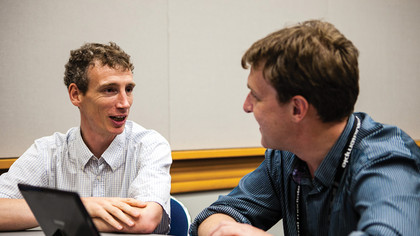What went wrong with MeeGo? 'Nokia lost faith in the project'
We meet Red Hat's 'community gardener' Dave Neary

LXF: Do you think things have settled down after the release of Gnome 3?
DN: I think it has. I think that Gnome 3 is looking better and better with each release. I'm still a Gnome 3 user, and although I know that several former Gnome 2 users have migrated to something else, I like the direction it's going in. Both Gnome 3 and Unity are following promising directions…
LXF: Which we thought was rather sad…
DN: It's interesting to see how similar both Gnome 3 and Unity have become in terms of their presentation layer and in terms of their user-interface.
LXF: Is it frustrating that Canonical couldn't be part of the Gnome 3 conversation?
DN: And, certainly, that was my position when the project was announced: "Can't we all just get along?" And sometimes when you have differences in vision, and they're not just differences in terms of the implementation details - we now have two groups exploring interface ideas - they're very similar, but I think they've kind of converged to be similar over time. And, let's see. At one point, one of these days, one of them is going to show through as the better solution, and I think that's what's going to win. It's not a competition. It's not a race.
LXF: It's the division. As you mentioned on your blog, haters are going to hate.
Get daily insight, inspiration and deals in your inbox
Sign up for breaking news, reviews, opinion, top tech deals, and more.
DN: It does make it easy, when you think about the other guys as 'the other guys', it does make it easy to ignore them. And that's when, going back to what David Eaves said in his talk, not just everything in the open source world, but everything in the world, is built on two building blocks; the relationship you have with someone and the ability you have to communicate with them.
And the article you refer to - the 'haters going to hate' article - it's an easy way to break down the communication. You say: "I don't have to communicate with these people, I have no relationship with these people". No negotiation is possible. There's nothing that can work without those two being in place.
LXF: Could you give us a quick overview of your awesome 'Ecclesiastes Principle' lightning talk?
DN: Simon Phipps coined the phrase, actually, and he's now asking me for royalties (laughs). It's Ecclesiastes 1:9, "Everything that has been will be again. Everything that has been done will be done again. There is nothing new under the sun," which has become an idiom. "Nothing new under the sun" has entered the zeitgeist.
It's a normal expression that we have now. And it represents, for me, the idea that we have a lot to learn from the past, and for us in the free software world, we tend to think that everything we're doing is new. And we try things and we see what works and what doesn't work, and a lot of wasted effort is put into trying things which have been shown to be sub-optimal in other areas. And two of the areas that I looked at for this particular lightning talk were 'architecture' and 'city planning'.
So, architecture is all about making buildings that work well for communities, families. City planning for broader communities and thinking about neighbourhoods as ecosystems of people who have to work together, live together and cooperate in a common space.
There are two books in particular I think we can learn a lot from. The first was Pattern Language by Christopher Alexander, which describes the characteristics of buildings; common characteristics of good buildings and how those characteristics relate to each other. Things like, 'have your main room have light on two sides', because this creates a better ambience around the building, or how you organise a living space into areas so that people know where there are centres to gather. He explains how these patterns correspond to each other.